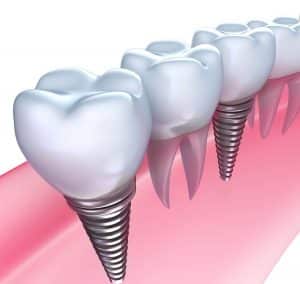 Performed for several decades, dental implants are considered a safe and a good alternative for replacing a missing tooth. When performed by qualified professionals, implants are very successful, especially for patients with good oral health.
Performed for several decades, dental implants are considered a safe and a good alternative for replacing a missing tooth. When performed by qualified professionals, implants are very successful, especially for patients with good oral health.
Of course, just like a coin, a dental implant has two sides. Majorly, it is often successful, but there are a small degree of risks involved. Before a dentist recommends you for an implant procedure, you have to be a candidate. This is to lower risk and increase the success rates.
If you are not eligible for surgery, your dentist will discuss other options that suit you. A patient who has sensitivity to titanium or any metal alloyed to titanium, such as zinc, iron, lead, nickel, or copper, may have to consider certain kinds of dental implants..
For you to qualify for dental implants, you need to have healthy gums and good health. Your level of oral hygiene should be high, and you should be cavity-free. Being a non-smoker is always helpful.
To answer the question, are dental implants safe? We can yes, they are safe, but sometimes there are a few risks involved, which are often minor and easily treatable.
Implants offer a safe method of replacing missing teeth, and in so doing, they help prevent other teeth from drifting in an effort to fill in the spaces left. In addition, with a complete set of teeth, you will find it easy to maintain healthy oral hygiene.
When compared to other tooth replacement options, such as dentures, implants offer a good way of replacing teeth with artificial ones that have a customized fit to your mouth shape.
What Risks and Problems Do Dental Implants Pose?
Just like any surgery, there are possible risks and complications that could occur with dental implants. Although rare, problems with implants can occur, but preventing the problem is of paramount importance.
Keep in mind that implants are a complex procedure, and there are several phases involved for them to be termed successful. It can take months for your gum to heal and implant to fully integrate.. Therefore, it is vital that you follow the treatment routine your dentist recommends, including regular appointments and checkups.
It is always important that you be honest with your dentist and ask questions you may have regarding implants. We will talk about the questions you ask before proceeding with dental implant therapy.
In a nutshell, here are the danger and risk factors involved;
Dental Implant Questions to Ask Before Surgery to Confirm About Safety of the Procedure
What anesthesia will the dentist use, and how will it be administered?
There are different anesthesia options a dentist can utilize on a patient. The aim of this question is to know the state of art care of the dental clinic. Before an operation, the patient should be injected with local anesthesia for normal procedures. If the operation will be more involved, sedatives can be injected via IV placed in the hand or arm.
Will the dentist monitor vital signs of risks/problems?
How long will the surgery take?
Final Thoughts: Are Dental Implants Safe or Not?
Dental implants have been successfully placed for many decades, and with technological advancements and the invention of better devices to help with surgeries, it is now safer than ever. Implants remain the most reliable and best option to replace missing teeth.
The most obvious benefit of implants is that they replace teeth in a more natural, unnoticeable manner, and allow patients to go back to their normal life. In addition, they are durable, safer, and can last a long time or life time.
We can recommend them to anyone who wants their missing teeth replaced. Talking to an experienced and well trained dentist to learn more about its safety and benefits can assist you in making the decision. Dr. Kiser has been practicing for over 16 years and he has kept current with this training and is a credentialed AAID ABOI Board Certified Dental Implant Specialist.





